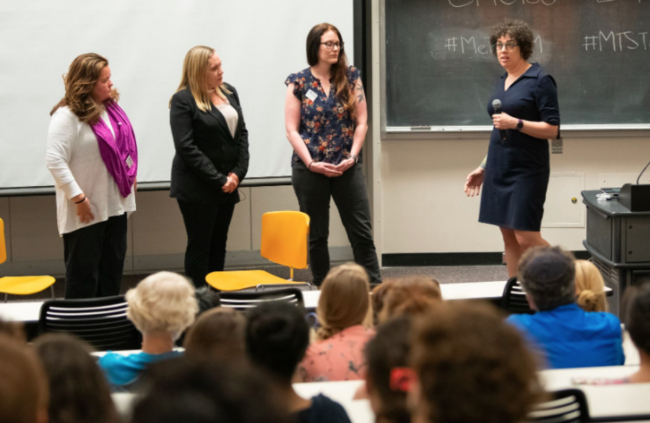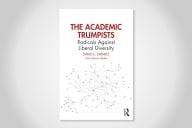You have /5 articles left.
Sign up for a free account or log in.

BethAnn McLaughlin, far left, at a recent MeTooSTEM workshop at the University of Washington. Also pictured, from left: Angela Rasmussen, Teresa Swanson and Sharona Gordon.
Charles Cotugno
MeTooSTEM has accomplished much since it was founded in 2018 to fight sexual harassment in academic science. Since November alone, according to the group’s accounting, it has engaged with more than 750 individuals requesting assistance, filed hundreds of open-records requests about harassment cases and made dozens of complaints to funding agencies regarding researchers' conduct.
The group has visited some 20 campuses to discuss federal laws governing gender-based discrimination and sexual misconduct in education, put on webinars and awarded $12,000 to advocates for women in science. Its founder BethAnn McLaughlin, also received the Disobedience Award from Massachusetts Institute of Techonolgy's Media Lab last year, alongside Me Too movement found Tarana Burke and consultant and activist Sherry Marts.
But in recent days MeTooSTEM has been called out for how it responded to a request for help. And former members of the group have since renewed their criticism of MeTooSTEM’s priorities and of McLaughlin, a neuroscientist who was until July an assistant professor at Vanderbilt University. Others have predicted the group will fold. What’s up?
“Generally, we had serious concerns about communication and leadership styles, a lack of transparency and victim advocacy training, and the priorities of the leadership,” four former members of MeTooSTEM -- biomedical professional Vidhya Sivakumaran, Cornell University postdoctoral researcher in molecular medicine Tisha Bohr, Indiana University postdoctoral researcher in physics Erica Smith and University of Illinois at Chicago developmental biology Ph.D. candidate Deanna Arsala -- said in a joint email. “Since our departures, we have been in contact with many victims who feel they have been mistreated and bullied by Dr. McLaughlin. We are deeply concerned and feel that this pattern of behavior is continuing to hurt others.”
Most recently, the women said, McLaughlin on Twitter “disparaged and lied about” Smith, who has been open about being a survivor of sexual misconduct.
McLaughlin declined to comment in detail about the former members' general allegations. She has previously responded to them in depth, here. But she said that MeTooSTEM continues to grow and that there is room for many more advocacy voices in science’s antiharassment movement. She urged against “punching down” on anyone fighting for positive climates across the sciences -- including her critics.
“I don’t want to be part of any organization that tells any woman how to speak her truth,” McLaughlin said. She added, “But if you want to know why I’m doing something, think about safety.”
The safety comment was a reference to what happened last week: McLaughlin, who receives regular requests to meet with survivors, became increasingly alarmed by someone asking, via Twitter, first privately and then publicly, to meet her in person and warning that she was under surveillance. McLaughlin consulted with a small group of core MeTooSTEM volunteers. Eventually Josh Fessel, an assistant professor of medicine at Vanderbilt, told the person asking for help to contact the police for immediate assistance. The anonymous person objected, saying such a directive went against MeTooSTEM's values and purpose. Some of McLaughlin’s critics saw the public part of the discussion and called it inappropriate, even "gaslighty," since MeTooSTEM was founded in large part to give those facing harassment alternative reporting options and support.
A conversation followed, with McLaughlin at one point tagging her attorneys and accusing Smith of "talking shit." Smith is "so done," McLaughlin also said. McLaughlin was subsequently accused of gatekeeping the movement.
Asked about critiques of her management and advocacy styles, McLaughlin said, “I kind of coined the ‘harasshole’ phrase. So knowing that, if you expect me to be everyone’s cup of tea, it’s not going to happen.”
McLaughlin has faced prior negative feedback about her tone. But Bohr emphasized that the issue is not primarily a stylistic one. Referencing her own earlier resignation letter, which was co-written with Julie Libarkin, a professor of geocognition at Michigan State University who manages a master academic harasser list, Bohr said that one of her biggest concerns “was the lack of organization and transparency, which made it difficult to get anything done or know what was going [on] or know what was expected of me or how to navigate the organizational structure.”
Bohr thought that she was joining MeTooSTEM with Libarkin as a co-founder, she said, “so that was an ongoing struggle that Julie and I were having -- not having any power to invoke the growth or change we thought was necessary because all our requests for access were basically ignored by BethAnn.” (Note: This sentence has been updated from an earlier version to reflect that Bohr thought Libarkin, not Bohr, would be a co-founder.)
She added, “I felt the movement needed to be more inclusive. Another big concern.”
Libarkin did not respond to a request for comment.
In their own separate resignation letter sent in April, Arsala, Sivakumaran and Smith cited a “lack of transparency, policies and communication within the organization leadership team.” That includes learning about MeTooSTEM initiatives on Twitter at the same time as the public, the women wrote, “without any prior discussion with the leadership team.” A Board of Directors also was created without the women’s knowledge, even though they believed they would be included on that board, they said.
Arsala, Sivakumaran and Smith also said that MeTooSTEM receives little input from racial and ethnic minorities, and that “many outside the organization have noticed it has prioritized the voices of cisgendered white women.” Additionally, the women said, some of their questions about the organization’s nonprofit status were met with “anger and retaliation,” unlike other white women's questions. MeTooSTEM is now a registered nonprofit organization.
Teresa Swanson, a recent MeTooSTEM award recipient and current core volunteer, and a community engagement specialist for the University of Washington's molecular and cellular biology graduate program, said the movement provides “a much needed space for previously ignored conversations about how harassment harms STEM, how to handle harassment and what needs to happen to change STEM cultures.”
MeTooSTEM as an organization provides “support to victims of gender and sexual harassment in order to help retain their health and careers,” she said. That includes providing them security cameras, covering other related expenses, hosting online support chats called MeTooSTEM Talks and advocating for small- and large-scale policy changes to protect scientists and hold harassers accountable.
Of McLaughlin, Swanson said she is a "tireless advocate for victims and is committed to learning, growth and change. In the time I've known her, she has constantly worked towards improving herself and the community she loves."
MeTooSTEM currently has a small board and group of regular volunteers. McLaughlin said that the organization’s ultimate goal is to ensure that the process of reporting harassment is no longer potentially more damaging to survivors' mental health and careers than the actual misconduct they've endured.
“Too often what is happening on campuses is that the Title IX process is driven by fear and university lawyers trying to protect reputations over individuals,” she said. “That’s unacceptable.”









